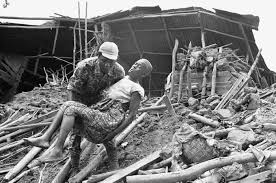The Fall of Enugu was a military conflict between Nigerian and Biafran forces in September and October 1967 during the Nigerian Civil War. The battle centered around Enugu, the capital of the secessionist Republic of Biafra.
Background
- In late 1966, ethnic tensions in Nigeria led to violence against Igbo people in the North.
- 30 May 1967: Eastern Region declared independence as Biafra with Enugu as its capital.
- Nigeria planned a four-phase suppression, targeting Enugu and Nsukka first.
- The Nigerian federal forces' initial progress stalled at Nsukka.
- Ojukwu, leader of Biafra, launched a diversionary attack into the Mid-Western Region in August 1967, capturing Benin City before being halted at Ore.
- Command of Nigerian troops at Nsukka was handed to Lieutenant Colonel Theophilus Danjuma.
- Enugu's defenses included Colonel Alexander Madiebo’s brigade and thousands of poorly armed civilian recruits.
Nigerian Offensive
- 12 September 1967: Nigerian forces advanced from Nsukka toward Enugu.
- Federal strategy: advance on a broad front to prevent Biafran roadblocks.
- Biafran resistance included counter-attacks, road blockades, and tree felling.
- By late September, Nigerian troops reached Milliken Hill, just outside Enugu.
- 26 September: Artillery and air bombardment of Enugu began.
- 3 October: Biafran evacuation began.
- 4 October: Enugu was occupied with minimal resistance. Ojukwu narrowly escaped.
Aftermath
Situation in Enugu
- Described by Danjuma as "an anticlimax".
- Federal garrison and civil administration led by Ukpabi Asika.
- City looted by federal troops.
- Population decline: fewer than 500 civilians remained.
- Red Cross established relief efforts.
- By 1978, damage from the war was still visible.
Impact on the War
- Enugu’s capture was expected to weaken Biafran resolve.
- However, Ojukwu relocated the capital to Umuahia and vowed to continue.
- The 1st Division paused in Enugu for six months, losing momentum.
- Olusegun Obasanjo later claimed the delay prolonged the war.
- Fall of Enugu led to loss of military supplies and temporary propaganda instability for Biafra.
- Biafran radio relocated but continued to broadcast as if it were in Enugu.
- Many Biafrans did not know Enugu had fallen until after the war.
